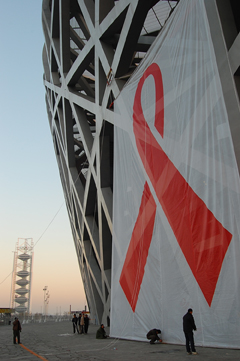Display on iconic “Bird’s Nest” highlights China’s commitment to the AIDS response
Beijing, 30 November 2008 – Chinese AIDS authorities, with the support of UNAIDS, today unveiled three giant red ribbons on the iconic National Stadium - colloquially known as ‘the Bird’s Nest’ - to mark World AIDS Day. The display illustrates China’s commitment to the AIDS response and in particular, to the fight against stigma and discrimination.
“The AIDS epidemic is not over anywhere. The AIDS ribbons on the Bird’s Nest symbolize the worldwide impact of the epidemic and the need for a unified global response,” said Dr. Peter Piot, UNAIDS Executive Director.
The red ribbon is the international symbol of AIDS awareness and is being worn by increasing numbers of people around the world to demonstrate their care and concern about AIDS issues. The ribbon is also a symbol of hope and offers symbolic support for those living with and affected by HIV and for those who have lost friends, family members and loved ones to AIDS.
Stigma and discrimination not only impact the lives of people living with HIV negatively, but also prevents people from talking openly about AIDS, which potentially places them and others at greater risk of HIV infection. People are also less likely to come forward to be tested and will hence not benefit from available treatment if they fear discrimination.
Research shows that there remain significant levels of stigma and discrimination among the general public in China. A recently published survey report presenting the results of a survey of more than 6000 respondents in six Chinese cities showed that:
- 30% of the respondents think children living with HIV should not be allowed to study at the same schools as children not living with HIV.
- Nearly 65% of the respondents would be unwilling to live in the same household with an HIV+ person and 48% of interviewees would be unwilling to eat with a person living with HIV.
“Stigma and discrimination are major obstacles in an effective response to AIDS. We need to engage all sectors of society in China to combat these issues and work together to stop the disease,” said Chen Zhu, Chinese Minister of Health.
Globally there are approximately 33 million people living with HIV. The latest estimates show that approximately 700,000 people are living with HIV in China, with approximately 50,000 new infections occurring in 2007. There were an estimated 20,000 AIDS related deaths in 2007. Sexual transmission is currently the most common way of HIV infection in China.
“Efforts such as these are essential in keeping the momentum in the AIDS response. I commend the Chinese government for illustrating their leadership in such an inspirational manner,” said Dr Piot.



